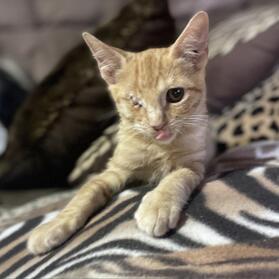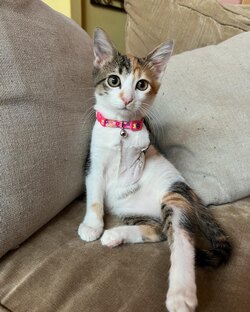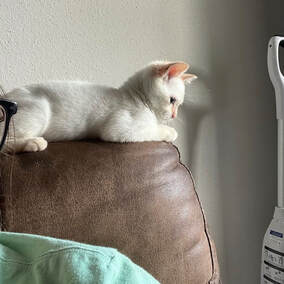|
By: Caroline McKenna, Executive Director In 2019, over 1,500 cats lost their lives in Galveston County shelters. There were almost no resources for community members caring for neighborhood cats besides trapping them and bringing them to a county shelter where they may or may not be accepted. Due to the often fractious behavior of the cats (not used to being confined indoors) and overcrowding at our overwhelmed county shelters, these cats often faced euthanasia. Community members caring for these cats felt helpless and like they had no option but to watch the cats they care for and often couldn’t touch give birth on their porches, under their trailers and in their sheds…two cats turning into five.. and then ten… and then twenty, with no end in sight. Lifeline of Galveston County was founded in September 2020 by myself and two other women. We felt passionately that Galveston County could reach a time in the near future where euthanizing pets in our county’s shelters out of necessity for space would no longer be needed. We knew that creating programs that supported the most vulnerable populations in these shelters would need to be our primary goal. In 2020, we attempted to launch a barn cat program to place at-risk feral cats. We placed over 30 in a few months but quickly realized the problem was too big for just a barn cat program. Throughout 2021, we started to TNR cats in our county. We built and grew connections with local vet clinics, other animal welfare organizations, and the municipal shelters in our county. In March 2022, we launched our official "Community Cat Program" with the assistance of S.A.V.E. Rescue Coalition's "Fix Ur Pet" high-volume spay/neuter clinic. Since March 2022, we have facilitated TNR for 348 Galveston County cats. We processed assistance requests and spoke individually to 251 citizens about solutions to their community cat problems, lent out 146 humane cat traps, and assisted 61 cats with transport to/from the clinic. We also provided emergency medical care to 13 community cats, provided over 2,500lbs of cat food to caretakers in our community, and much more. Two of our county's municipal shelters now rely solely on our program to divert community cats out of their shelters. Cat euthanasia at our country's shelters has decreased drastically since 2019. The cities who participate fully in our program collectively have euthanized less than 75 cats since the beginning of 2022. This is certainly a big accomplishment considering over 1,500 cats lost their lives in 2019. We still have work to do as cats being brought into a municipal shelter from Texas City are still at a high-risk of being euthanized. Cats brought in from Texas City, who do not follow the same intake diversion technique that the other cities participate in, are still very much at risk. In fact, 270 cats from Texas City have lost their lives since the beginning of 2022. Remember this is compared to less than 75 cats losing their lives in every city (8 cities) combined who participate in our program fully. Lifeline is working diligently to change this. Building a safety-net program to support Texas City cats entering the shelter is our top priority for the end of the year and 2023. Of course our TNR focused Community Cat Program was just the beginning. In June, we launched a Foster/Adoption Program with a big focus on diverting kittens born into Galveston County cat colonies out of the shelter. Since June, we have taken 41 kittens into our program, and have adopted out 37 of them so far. As more people have learned about us through social media and through referrals by word of mouth or our county's municipal shelters, we have tried our best to increase capacity in both our Community Cat Program and Foster/Adoption Program. Right now, our biggest constraint is funding for supplies and veterinary care. So far in 2022, we have provided urgent veterinary care to 11 community cats including wound repair, abscess treatment, upper respiratory infection treatment, ear infection treatment, mange treatment, scabies treatment and more. We’ve also provided extra medical care (besides the basic spay/neuter, deworming, core vaccines and microchip all our adoptable cats receive) to 19 fosters so far. This included treating life-threatening worm and intestinal infections in kittens, eye removal surgery, leg amputation and even taking on a 3 month old kitten with megacolon, a non-life-threatening condition that requires acute care until a complicated surgery can be performed when the kitten turns 1 year old. We are lucky to have a great relationship with S.A.V.E. Rescue’s Fix Ur Pet Galveston County clinic. They support us a lot with spay/neuter for community cats and our foster kittens. As we increase capacity in our current programs and continue to fight to save other populations of pets currently dying in our county’s shelters, we need support. Currently, our biggest need is to raise funding for non-spay/neuter related veterinary care. We have a generous donor willing to match up to $5,000. With your support, we hope to raise an additional $5,000 so that we can reach $10,000. This money could help us provide 52 more cats or kittens with life-saving veterinary care.
No matter how much you can donate, every little bit helps. You can donate in any of the following ways:
Thank you for your time! Caroline McKenna Co-Founder and Executive Director Lifeline of Galveston County Colby Jack's Story We got a call from a citizen in Texas City about a colony of cats living near her home. She had noticed two kittens in particular with severe eye issues. One kitten's eye was literally bulging out and appeared to be severely infected! We knew the kitty needed emergency care, but a willing foster needed to be found. Luckily a nearby neighbor with lots of cat experience stepped up and opened her home to the babies. The littles were rushed to the vet by an amazing Lifeline volunteer and her son, who adorably started calling the orange and white stripped kitty "Colby Jack." There they where assessed, tested for respiratory viruses, de-flead, received antibiotics, pain meds and eye meds. It was determined that "Colby Jack" would need to have his eye removed. His sister, "Brie," would not need any surgery but would always have a underdeveloped eye. We later learned the two had microplasma and chlamydial conjunctivitis. They were exposed to these bacteria's either by an infected mother cat while being born on the streets or encountered it on the streets early in their lifetime. These infections caused severe issues with their eyes. Luckily, we were able to provide them with antibiotics to end these terrible infections. About a week later, "Colby Jack" had surgery to remove his eye at SNIP of Texas in League City. Him and his sister recovered in their foster home and have grown into two beautiful, healthy, friendly kitties. Reese's Pieces Story We got a call one weekend from a good samaritan who was frantically looking for help! She had found a kitten running through traffic on the highway and the kitten was dragging her front leg. The finder and her family were gracious enough to let the kitten rest in their home. We were contacted that evening and after speaking with the finder, determined emergency care was not needed that night. We schedule an appointment at the vet for the next morning. It was determined by the vet that the kitten, now named Reese Pieces by her human foster sister, was likely hit by a car and had a club foot that would never work again. We decided to get another opinion from another veterinarian to make sure amputation was really the best option. They agreed that it was. We waited for the little kitty to get a bit bigger so the surgery would not be as risky. During that time, her foster family found her a forever home! She moved to her new home and a couple weeks later we brought her to SNIP of Texas in League City where her leg was amputated. Reese Piece's is doing great in her new home, and we are so happy we were able to be apart of her journey. Cauliflower's Story Cauliflower was born to stray cat and found herself in a local high-intake municipal shelter with her mom and siblings. She was failing to thrive and placed into foster care with one of our co-founders, board member and administrative director, Jen. After some long nights and days, Jen was able to stabilize baby Cauliflower through frequent bottle feedings and expert care. However, Cauliflower continued to have unpredictable GI issues that threatened her health and quality of life. She struggled to put on weight and was not growing like she should have been. After many trips to the vet and trying different treatment options, nothing was working and no one could figure out why this was happening. We officially pulled Cauliflower into our program and continued diagnostics. Through many x-rays and vet visits, it was determined the sweet kitty, now three months old, had megacolon. This means a part of her colon is stretched and "mega-sized." It will not go back to normal on its own. She needs many medications to help her successfully pass stool. There is a surgery that can be done to remove that part of the colon and hopefully give Cauliflower the chance at a nearly-normal life. However this is a pretty complicated surgery and too risky to perform on a small kitten. So, Cauliflower's foster mom, Jen, is managing her condition until she is big enough to receive surgery. We expect she will be able to receive the surgery next year. This will likely be a very complicated and expensive procedure. However, Cauliflower is the sweetest girl. She loves hanging out with her dog and cat foster siblings and doesn't mind taking her daily medications. She is a spunky kitty and deserves the chance at a normal life! We will try our best to give her that chance.
0 Comments
Leave a Reply. |
About Our Update SectionStay up to date with our current projects, read stories about the pets we've helped and learn about animal welfare topics specific to Galveston County. Categories
All
Sort By Month
March 2024
|



 RSS Feed
RSS Feed
